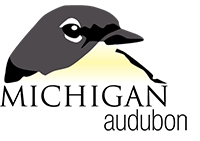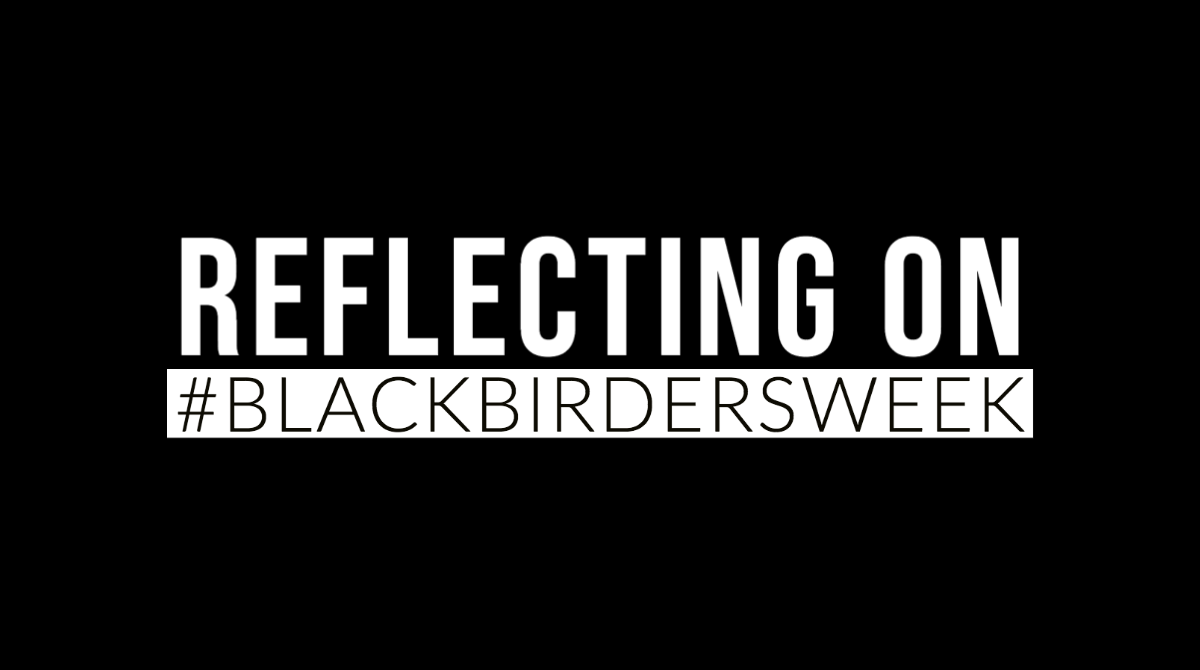It has been over a week since the inaugural Black Birders Week initiative was brought to life by a group of committed Black nature enthusiasts and Michigan Audubon wants to say thank you to those who put this important movement together so swiftly!
Black Birders Week was inspired by an incident in late May, when Christian Cooper documented a racist encounter while birding in New York City’s Central Park. Historically, birdwatching is often seen as a hobby of predominantly white individuals. Unfortunately, our fellow birders, conservationists, and outdoor enthusiasts who aren’t white will bear the weight of prejudices like those experienced by Mr. Cooper when practicing this interest we all love.
If you are just learning about Black Birders Week or you didn’t get a chance to follow the events in real-time, we encourage you to watch Birding While Black: A Candid Conversation Session 1 and Session 2 on the National Audubon Society Facebook page. The two panels featured several Black birders and conservationists of varying ages and experience answering questions such as “Have you ever experienced racial profiling while birding or conducting fieldwork?” and “What changes can be made to better facilitate inclusivity in the birding community?”. The answers are illuminating, unique, important, and reflective for — and of — us all. Ultimately, Black Birders Week established the beginning of an empowering movement.
What were the founders’ goals for Black Birders Week?
- To counter the narrative that the outdoors is not the place Black people should be.
- To educate the birding and broader outdoor-loving community about the challenges Black birders specifically face.
- To encourage increased diversity in birding and conservation.
Formed in 1904, Michigan Audubon is a grassroots member organization and we are advocates for birds, for people, and for the environment. It is our mission to connect birds and people for the benefit of both. As such, acknowledging social issues and taking action in ways that relate to our mission is absolutely our work, especially when it benefits birds and humans in ways that translate to greater appreciation and stewardship of the natural world. For Michigan Audubon to ignore the issue and not support the core messaging and call to action of Black Birders Week would be wrong. After all, in this movement of awakening to being better stewards of the earth, we cannot leave out our fellow humans.
“To those who paused to listen and reflect, thank you. For seeing how birds connect everyone and the unique ways birds connect us. For engaging in whatever meaningful, honest way you did in Black Birders Week, thank you. We know it doesn’t stop here and we want you to be a part of our work from here on out. To all the organizers and voices of the Black Birders Week movement, to Dr. J. Drew Lanham for his long history of writing and speaking insightfully and valuably about the experience of Black birders, thank you. For your willingness to join us in welcoming all to a more equitable, freer, more accessible experience of the natural world and the birds we appreciate so much, thank you.”
~Heather Good, Executive Director, Michigan Audubon
What We Heard During #BlackBirdersWeek
After listening to the discussions, reading the articles, and following the initiative on social media, one thing has become abundantly clear to us — we all need to be more proactive about the barriers that Black and other non-white people face in nature. It’s more than a moment: we have to face this issue because it does affect birds, the environment, our efforts to conserve and protect them, and ultimately, our success in doing so to the fullest extent humanly possible. We’ve got work to do and we needed to hear the feedback, the feelings, the insights, and the issues of racism, the environment, and the enjoyment and protection of the natural world.
As an organization, we recently shared our message denouncing systemic racism and supporting the Black Birders Week initiative. While we resoundingly had more positive than negative feedback on this, it is clear there were some that were uncomfortable with the topic. Some individuals feel a sense of ownership to birding and prefer to maintain a distance between their beloved hobby and social issues. Others simply saw Black Birders Week as a political issue that has no place in the birding world.
While we hear people’s frustrations, we feel it is of utmost importance to understand the perspectives of individuals like Corina Newsome, a graduate student in biology with a focus on avian conservation and her feelings during the Birding While Black panel discussion. “In (these) online birding groups and naturalist groups, there’s always someone trying to silence Black people sharing their experience and brushing it off as being political.”
Panellist Kassandra Ford, a Ph.D. candidate in evolutionary biology, echoed Newsome’s view, adding, “We’re not trying to be political here; we are literally trying to talk about our lives, talk about our experiences, and try[ing] to get other people to understand what we’re going through.”
At times, non-white birders feel the need to justify their participation within spaces where their presence might be misunderstood. During the Birding While Black panels, participants shared practices they feel they need to do to make sure they appear to “belong” when they are birding. Some answers included wearing hats, t-shirts, and pins that advertise nature organizations, always carrying a field guide, running down their credentials when talking to people, and appearing to look through binoculars — even when there aren’t any birds around — just so people can see what they are doing.
Dr. J. Drew Lanham, professor of wildlife ecology at Clemson University, shared, “There’s a psychological shell game that you’re constantly playing of trying to figure out how people are sizing you up and that takes energy…it’s sort of a constant thing almost. You just get used to doing it. It’s like another pair of rubber boots that you’ve got to pull on every single time that you go birding. That weight, that energy that we expend as Black people in trying to mollify other people and satisfy them with who we are…I’d like for that not to be the case someday.”
Key Takeaways From Black Birders Week
Listen. Think. Take Action.
Just as birds can serve as ecological indicators, it’s clear they are social indicators, too. The sensitivity and ecological role of birds makes them increasingly valuable reflections of the state of the world. As we saw during the impressive, powerful, eye-opening Black Birders Week, birds provide opportunities for us.
Simply put, the protection, health, and appreciation of birds really does have a lot to do with the state of the world. When we listen to birds, we glean insights about how we can remediate or minimize the negative effects of the plethora of human impacts, for example.
Black Birders Week may be over but we will continue to listen and learn from one another and to develop and share actionable items that you can utilize within your birding communities to help make them more inclusive.
“We all bear responsibility to make the world a better place and this is no different within the world of birding – even in our state of Michigan. This is the time not only for those that experience racism and prejudice to become active but also for those of us who consider ourselves allies too. What can we do now to ensure all people can experience the same level of comfort and excitement that the majority of us experience when birding? How can we make sure those individuals not traditionally part of our birding communities feel welcome and comfortable within our ranks? And how can we best engage with our local non-white and lower socioeconomic communities so the future of birds and conservation will continue in good hands?”
~J. A. Mikulich, multicultural marketing consultant, avid birder, and photographer
Where Do We Go From Here?
As an organization, we see our role in this as an important one.
As we work to respond thoughtfully and proactively, we realize how vital it is that we get to a more diverse, equitable, and inclusive environment both inside and outside the doors of businesses, organizations, schools, and homes.
As Michigan’s oldest conservation organization, we pledge:
- To continue our work to recruit and retain multi-culturally sophisticated employees, board members, and supporters to build a stronger culture of inclusion within our organization.
- To create additional birding and bird conservation outreach programs that reach new audiences throughout the state.
- To make birds and bird conservation more accessible, inclusive, and reflective of a diverse, multicultural world through our mission of connecting birds and people for the benefit of both through conservation, education, and research efforts.
Diversity, Equity, and Inclusion work is ongoing, cross-functional work that is imbued throughout the organization. It is includable, accountable, ongoing work. We know an Action Plan is not a one-and-done solution, a token initiative, a checkbox, or simply one organization’s responsibility. We are acknowledging that it takes everyone’s participation, focus, and follow-through.
What You Can Do As an Ally in the Conservation World
- Acknowledge that each and all of us have a responsibility to be part of the solution by listening to and learning from one another, asking difficult questions and having even more difficult conversations, self-examining, and determining how we can be a part of change
- Talk with your family, friends, and other people about how racism can affect people’s experiences, even within shared natural spaces
- Support the leadership of people of color within the conservation world
We Want to Hear From You
We encourage you to share your replies with us. Help us continue this work, and help us do the work that really matters in our communities — work that doesn’t leave out people or birds.
Michigan Audubon is gathering thoughts, opinions, resources, etc. from individuals who engaged with the inaugural #BlackBirdersWeek. If you are willing to share your thoughts and reflections on #BlackBirdersWeek with us, we would love to hear from you and invite you to take our survey.
Resources to Explore and Media Coverage of Black Birders Week
Rules for the Black Birdwatcher – With Drew Lanham
BirdNote. Feb. 28, 2015
Birding While Black
By J. Drew Lanham. Literary Hub; Sept. 22, 2016
Bird-Watching While Black: A Wildlife Ecologist Shares His Tips | Short Film Showcase
National Geographic. Nov. 6, 2016
The Home Place: Memoirs of a Colored Man’s Love Affair With Nature
By J. Drew Lanham. June 13, 2017
‘Black Birders Week’ Promotes Diversity and Takes on Racism in the Outdoors
By Jillian Mock, National Audubon Society, June 1, 2020
First, Listen. Then, Learn: Anti-Racism Resources For White People
By Julia Wuench. Forbes; June 2, 2020
These Black nature lovers are busting stereotypes, one cool bird at a time
By AJ Willingham. CNN; June 3, 2020
Black Birders Week: An Ode to Our Allies
By Crystal Johnson. June 4, 2020
Birding While Black: A Candid Conversation — Session One
National Audubon Society Facebook Live; June 4, 2020
Birding While Black: A Candid Conversation — Session Two
National Audubon Society Facebook Live; June 4, 2020
Black Birding Is About Hope
By Kathleen Hou. The Cut; June 4, 2020
7 Anti-Racist Books Recommended by Educators and Activists
By The Editors. The Strategist; June 5, 2020
Racist Birding Incident Sparks Joyful Online Event #BlackBirdersWeek
By Julie Grant. The Allegheny Front; June 5, 2020
Black Birders Call Out Racism, Say Nature Should Be for Everyone
By Andrea Thompson. Scientific American; June 5, 2020
Birding While Black: Jason Ward On Central Park Video, Racism And His Passion For Birds
Karyn Miller-Medzon produced and edited this interview for broadcast with Peter O’Dowd.
This segment aired on June 9, 2020.
Birds of North America with Jason Ward
Video series following Jason Ward as he travels around the United States meeting birders and bird enthusiasts of all kinds. Currently 24 videos in the series.

